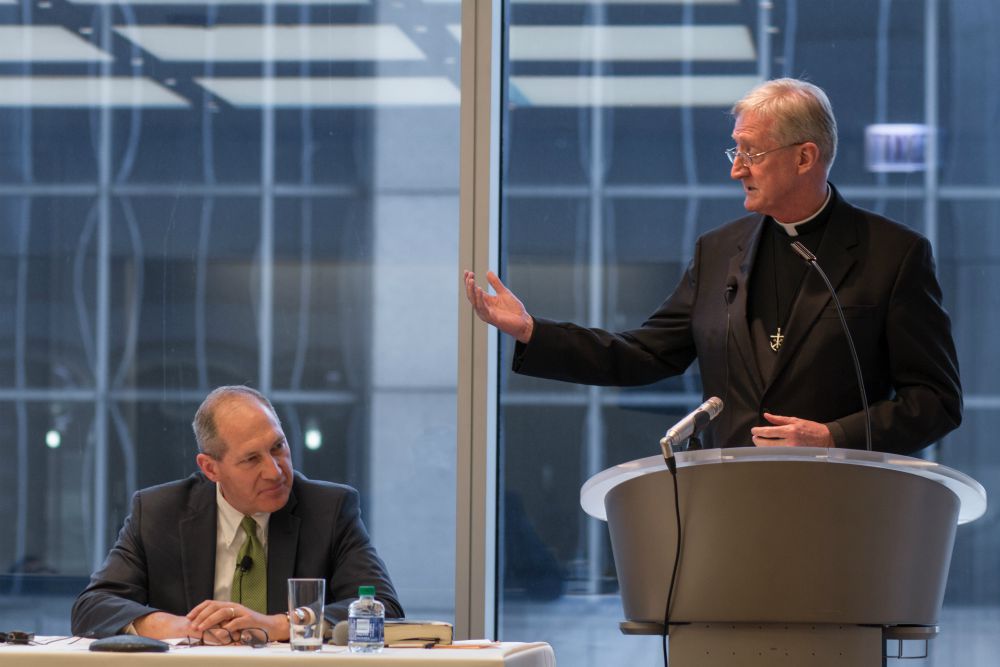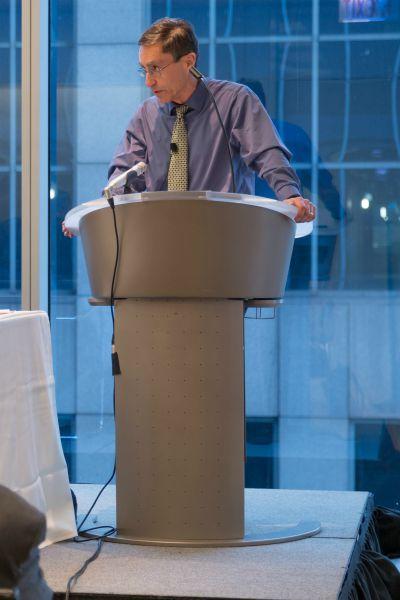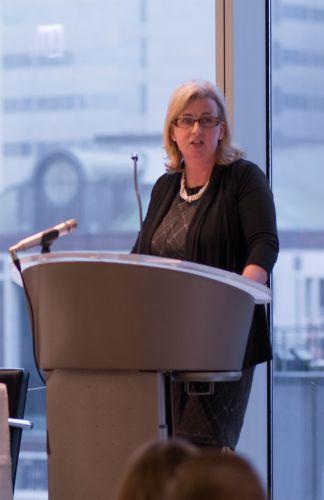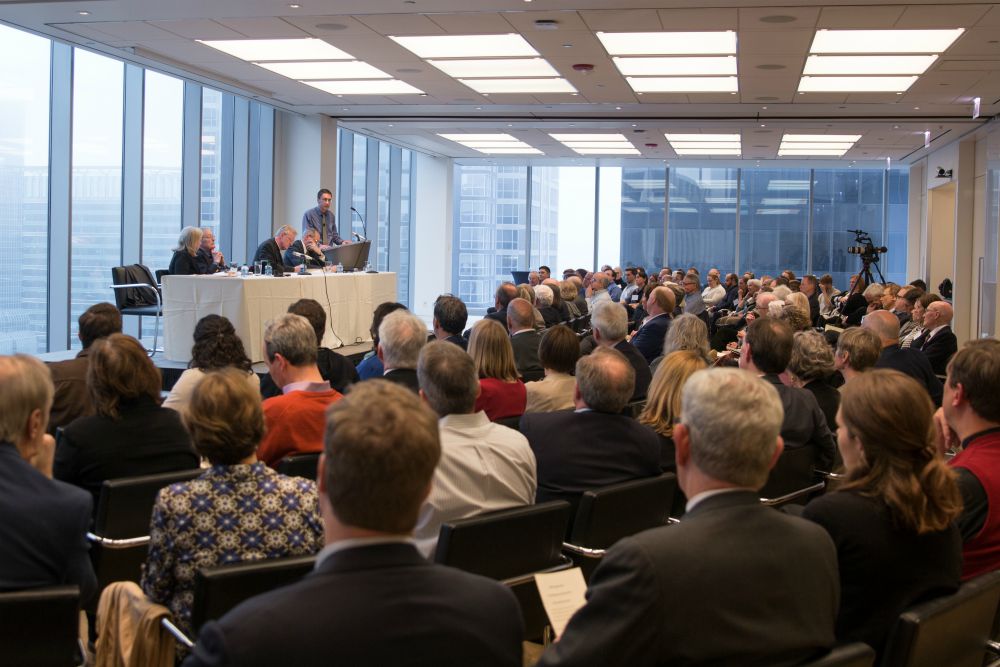
Holy Cross Fr. Wilson "Bill" Miscamble, right, author of "American Priest: The Ambitious Life and Conflicted Legacy of Notre Dame's Father Ted Hesburgh" spoke about the book at panel discussion that included three respondents, May 2. Pictured is John Breen,who moderated. (Courtesy of the Lumen Christi Institute)
The author of a new controversial biography of Fr. Theodore "Ted" Hesburgh said he tried to approach his subject with a historian's eye, but at least one critic of the book believes the author's ideological prejudices got in the way of telling an accurate story of the former president of the University of Notre Dame.
Although Hesburgh is "unquestionably the most significant figure in the modern history of Notre Dame," his "glowing portrait" is "a bit more blurred" and "the exact nature of his accomplishments more debatable," when examined within a larger historical context, said Holy Cross Fr. Wilson Miscamble, a professor of history at the university.
The author of American Priest: The Ambitious Life and Conflicted Legacy of Notre Dame's Father Ted Hesburgh spoke about the book at panel discussion that included three respondents. The May 2 event in downtown Chicago was sponsored by the Lumen Christi Institute at the University of Chicago.
Hesburgh, who led the university for 35 years and died in 2015, personified the push for Catholic assimilation in America, Miscamble said, arguing that the priest simultaneously desired greater independence from his religious order and from the institutional church, while becoming dependent on the regard of the "liberal establishment," especially the "higher education elite."
"The desire to be part of the elite circles of power and influence colored how he led Notre Dame as well as the causes he pursued," Miscamble said, asking, "Might it even be said of him that he did perhaps too much kneeling before the world?"
Miscamble is the author of several academic history books, but also of For Notre Dame: Battling for the Heart and Soul of a Catholic University, a collection of essays arguing for a stronger Catholic identity and against things like hosting a production of the "The Vagina Monologues" on campus. Miscamble led opposition to the university's invitation to President Barack Obama to commencement in 2009.

William Cavanaugh, professor of Catholic Studies and Director of the Center for World Catholicism and Intercultural Theology at DePaul University (Courtesy of the Lumen Christi Institute)
He said Hesburgh asked him to write "a serious history," but Miscamble admitted that it was difficult to "criticize his actions and inactions," given how well-loved and respected the former president is on campus.
"Those who think of Notre Dame as a sort of mere brand, to be promoted and protected, may not be enthusiastic about some of what I've written," he said, "but those who understand what a real Catholic university is, I believe, will welcome it."
Journalist Kenneth Woodward, former religion editor of Newsweek magazine and a Notre Dame alum, gave a strong critique of the book at the Chicago event. As a friend of Hesburgh who contributed to a recent documentary film about him, he criticized what he saw as "an undertow of ideological accusation" in Miscamble's book.
Citing a "slow drip, drip of acid asides" and "intentionally pejorative" language that mischaracterized Hesburgh as a "toady," Woodward said Miscamble's accusations were "not a conclusion reached by argument or evidence" but a predetermined assumption.
For example, on the issue of abortion, Woodward noted that Hesburgh embraced the "seamless garment" approach to pro-life issues — "and you, it would appear do not," he said directly to Miscamble. The book implies that Hesburgh eschewed prolife demonstrations because it would have put him at odds with the "liberal establishment" in academe.
"On abortion and related life issues, [Hesburgh] preferred working with people he disagreed with, rather than shaking a fist at them," Woodward said. "The difference between your tactics on abortion and Ted's do not justify [such a] conclusion about Hesburgh's moral character."
Miscamble responded by defending that criticism of Hesburgh. "Imagine if Father Ted had committed to the life issues what he committed to civil rights for African Americans?" he asked. "I suspect maybe the debate in the United States might be slightly different."
Instead, Hesburgh got "caught in the web" of the "liberal establishment," Miscamble said.

Jennifer Mason McAward, director of the Klau Center for Civil and Human Rights and associate professor of law at Notre Dame Law School (Courtesy of the Lumen Christi Institute)
Woodward, author of Getting Religion: Faith, Culture, and Politics from the Age of Eisenhower to the Ascent of Trump, disagreed. After listing his many connections to Hesburgh over the years, Woodward concluded: "I never met the man you describe in your biography as the liberalist establishment's 'accommodating and acceptable priest.' "
"Did he make mistakes? Of course," said Woodward. "But he took risks. Above all, he dared to dine with sinners and even invite some of them to come speak on campus. There is, I believe, a powerful Christian precedent for that."
Other panelists also defended Hesburgh's legacy. As the director of the Klau Center for Civil and Human Rights at Notre Dame (which Hesburgh founded), law school faculty member Jennifer Mason McAward has researched his involvement in civil rights.
She challenged Miscamble's assertion that despite Hesburgh's tireless advocacy on the issue, he had only modest impact, arguing instead that he provided moral and policy leadership, as well as what she calls "the leadership of personal connection" with individual citizens.
As a member of the U.S. Commission on Civil Rights from 1957 to 1972, Hesburgh "consistently gave public voice to the moral outrage of racism," McAward said.
While he was not the "only voice," the image of a white Catholic priest like Hesburgh — as in the famous photo of Hesburgh with the Rev. Martin Luther King Jr. at Soldier Field in 1964 — provided a legitimacy to the civil rights movement that was sadly necessary at a time when a majority of Americans had a negative view of the now-revered King, she said.
Responding to Miscamble's earlier question, McAward said, "In the realm of civil rights, Father Ted did no kneeling before the world of the powerful, but he did kneel before the weak and disenfranchised as a servant leader."
Advertisement

Panel discussion "The Legacy of Fr. Theodore Hesburgh, CSC" May 2 (Courtesy of the Lumen Christi Institute)
Miscamble responded that he agreed that Hesburgh was "deeply committed to civil rights," but contested a view that overestimates his central importance and tends to conflate Hesburgh with the commission as a whole. "I see him as a second-level, figure," Miscamble said, which he admitted is still "an important contribution."
Respondent William Cavanaugh of DePaul University agreed that Hesburgh was part of a broader Catholic assimilation into American culture during his generation, but wished Miscamble would have also critiqued Notre Dame's assimilation of conservativism, including corporate culture and the military.
When he was an undergraduate at Notre Dame in the 1980s, Cavanaugh said the push was to get graduates into corporate boardrooms and at the helm of nuclear submarines. "Whether this has been a victory for the Gospel is not so clear," he said.
He also disagreed with Miscamble's portrait of Hesburgh as naïve compared to President Ronald Reagan in his approach to the Soviet Union and communism. "It's the people who bought Reagan's story, not Hesburgh, who were naïve," said Cavanaugh, a professor of Catholic studies and director of the Center for World Catholicism and Intercultural Theology at DePaul.
On the topic of Catholic higher education, the influence of secularization cannot be denied, Cavanaugh said. "Whether or not that failing can be laid at the feet of Fr. Hesburgh, however, is a more complicated matter," he said, disagreeing with Miscamble's criticism of lay control of Catholic universities. "Do we really think Catholic higher education would be better off if bishops had more control?"
"Notre Dame today, in my judgement, is in better shape with regard to Catholic identity than any other Catholic university, maybe in the world," said Cavanaugh. "And I think Fr. Hesburgh needs to be given credit for this."
On the first part of that statement, at least, Miscamble agreed: "The broad Catholic culture of the school remains," he said. "Father Ted brought us to a certain place, but there's much work to be done."
[Heidi Schlumpf is NCR national correspondent. Her email address is hschlumpf@ncronline.org. Follow her on Twitter @HeidiSchlumpf.]






